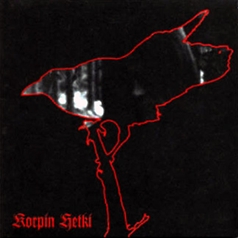Though a brief and somewhat rare offering, this is one of my favourite Horna releases. The material presented on Korpin Hetki dates back to 1999 and, despite the erroneous claims of many online sources, is not the first recording with new vocalist Corvus. This is a case where one faulty report is made on the internet and various other sites use the original mistake as a basis for keeping such misinformation alive. This material predates Sudentaival and features the band's original vocalist, Nazgul von Armageddon. This E.P. includes only three songs, one of which is a cover tune and another that can be found on their previous full-length, yet the recording is still just as vital as any other from this period.
Musically, this of course belongs to the band's early period. The music owes a lot to the early Norwegian bands, yet Shatraug's style had begun to develop a bit and to become more his own, by this point. The first track, "Ikuisuuden Pimeyden Varjoihin", relies on brilliant tremolo melodies that interchange with more old school riffing, displaying a very accomplished mixture of First and Second Wave sounds. There is a gloomy atmosphere that is easily conveyed by the guitar riffs, with the rest simply serving its purpose as an unassuming background that in no way distracts from the primary focus. The melody is very haunting and possesses kind of a horror vibe. "Condemned to Hell" is a cover of an old Impaled Nazarene track and, though not done poorly, does not quiet hold up to the other two songs. It is impressive that Horna manages to sound more necro and under-produced than the 1992 original; then again, Tol Cormpt Norz Norz Norz... had a rather good sound for its time. The other original track is "Synkän Muiston Äärellä", which displays a similar type of raw and grim Black Metal. The thrashier parts seem a little more pronounced, at times, giving this a decidedly '80s feel. Some riffs seem to hearken to the early days of Emperor, as well, betraying another of the band's Norwegian influences. It certainly kills the over-produced version that is found on Sudentaival. Too bad they didn't release more necro versions of some of the other tracks from that record.
It must be stated that the production found on this E.P. truly suits the material much moreso than the imitation Abyss Studio sound on the aforementioned full-length. The true weakness of that album was not so much the material but the slick and overdone sound that ruined any attempts at atmosphere. By hearing one of the tracks in an earlier and more natural version, one can really begin to see past the mistakes and realize that the material was not so bad. Korpin Hetki features the kind of necro sound that rivals that of Wrath of the Tyrant or Under A Funeral Moon, at times. The percussion is not as overbearing and, as a result, the riffs are actually able to breathe and to maintain the listener's full attention. The raw and fuzzy sound serves greatly to accentuate the musty, old school songwriting and to take you back in time a decade or more (from the release date of the E.P.).
In the end, this is an absolutely essential release for any Horna fan and it fully deserves as close of a listen as any of their other records. As the band was in a period of transition, this E.P. helped not only to keep the name out there and to clear off material with their past vocalist, but also to present fans with more filthy Black Metal in a way that few others were able to deliver at the time. Korpin Hetki may be somewhat overlooked, but it should not be. Seek these songs out in whatever way that you must.
In the end, this is an absolutely essential release for any Horna fan and it fully deserves as close of a listen as any of their other records. As the band was in a period of transition, this E.P. helped not only to keep the name out there and to clear off material with their past vocalist, but also to present fans with more filthy Black Metal in a way that few others were able to deliver at the time. Korpin Hetki may be somewhat overlooked, but it should not be. Seek these songs out in whatever way that you must.
.jpg)









